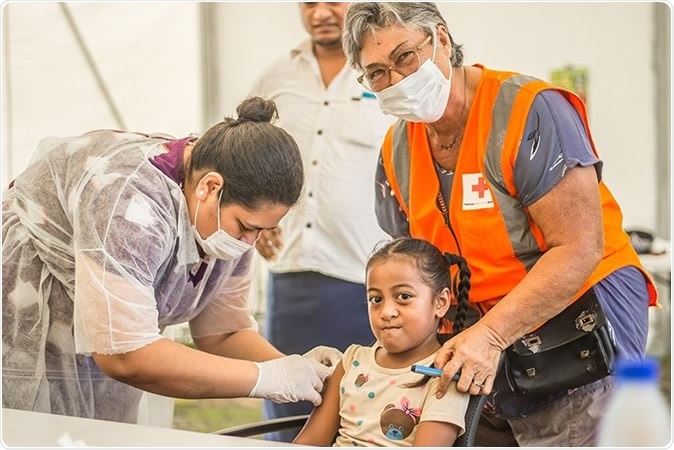The Pacific island nation of Samoa will shut down its government services for two days while officials try to stem a deadly measles outbreak that killed 53, 48 of whom were children between 0 and 4 years old and sickened 3,728 people.

In response to the current measles outbreak, the Government of Samoa will be undertaking a ‘Door to door Mass Vaccination Campaign’ on Thursday 5th and Friday 6th December, 2019 from 7am to 5pm throughout the whole country.
Civil servants will focus on a nationwide immunization drive and a compulsory mass vaccination program. The program has focused on children and young women. Since November 20, there had been more than 58,000 people vaccinated.
In recent years, Samoa has reported almost no cases of measles to the World Health Organization (WHO), not until October 16. The government of the Pacific island nation of around 200,000 people reported its first outbreak of measles. During mid-November, the government declared a state of emergency due to the rapid spread of the highly contagious viral infection.
Despite efforts, the outbreak continued, and the number of cases ballooned. On December 1, the government saw 198 new measles cases in the last 24 hours alone. The government, in the hopes to lessen the spread of the disease, closed schools and had barred students from attending public events.
Prime Minister Tuilaepa Sailele Malielegaoi said the government aims to immunize everyone in the country, with about 200,000 people aged under 60 years old. To attain the goal, the government services would close for two days to allow the public servants to assist in the mass vaccination in the country. It is estimated that 2,000 to 3,000 government employees will take part in the immunization campaign.
Lower immunization rates
The World Health Organization and UNICEF report that the country’s measles vaccination rate for infants was just 31 percent in 2018, which is lower than the 6-0 to 70 percent in the past years, and a high rate of 90 percent in 2013.
Over the past years, anti-vaxxers went against immunization, and the circulating news on the effects of vaccines has left many parents reluctant to have their babies vaccinated. As a result, many countries, even wealthy ones, such as the United States and Germany, have reported measles outbreaks.
Government response
The Prime Minister is urging everyone to participate in the mass immunization to protect against the highly contagious measles.
“Let us work together to encourage and convince those that do not believe that vaccinations are the only answer to the epidemic,” Prime Minister Malielegaoi said.
“Let us not be distracted by the promise of alternative cures. Measles is not a new disease to Samoa and rarely claimed lives,” he continued.
He added that certain issues that people should understand. First, he said that vaccination is the only cure for the outbreak if patients are treated early, full recovery should be expected, and no traditional healers or Kangen water preparations can cure measles.
“The answer to our prayers is with us through the services of the doctors and nurses and all health personnel. I would again call on everyone’s cooperation to protect our children; seek medical care for sick children early, ensure family members, especially children, are vaccinated and maintain good hygiene standards in all environments,” the Prime Minister said.
What is measles?
Measles or rubeola is a highly contagious disease and remains one cause of death among young children across the globe, even with access to safe and effective vaccines.
Typically, it can be transmitted through droplets from the nose, mouth and throat, when an infected person sneezes or coughs. The first symptoms may be experienced about 10 to 12 days after infection, including a runny nose, high fever, tiny white spots inside the mouth, and bloodshot eyes. After several days, a rash develops that starts from the face and upper neck, and slowly spreads downwards.
In patients without the vaccine and those with compromised immune systems, measles can lead to serious complications like blindness, severe diarrhea and dehydration, severe respiratory infections such as pneumonia, and encephalitis, an infection that causes brain swelling.
The only way to curb the outbreak and to prevent infection is by getting the vaccine.